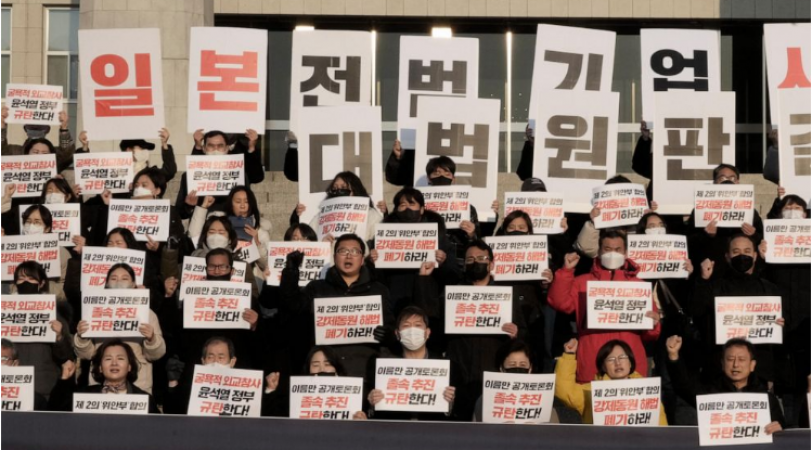
South Korea: As they desperately try to mend relations with Tokyo that have deteriorated in recent years over historical grievances, South Korean officials are considering setting up a domestic fund to compensate Koreans who were held as slaves by Japanese companies prior to the end of World War II.
The plan, which was made public during a hearing hosted by Seoul's Foreign Ministry on Thursday, was sharply criticised by the victims and their attorneys, who have insisted that Japan be the source of the reparations.
Since South Korea's Supreme Court upheld lower court rulings and ordered Nippon Steel and Mitsubishi Heavy Industries to pay compensation to Korean forced labourers in 2018, relations between Seoul and Tokyo have been strained.
Also Read: Earthquake hits Indonesia, know its intensity
As a result of the defendants' refusal to enforce the orders, the plaintiffs have taken legal action to compel the defendants to sell off local assets to pay damages, a move that South Korean authorities fear will exacerbate the rift between Seoul and Tokyo. The Japanese companies have also been demanded to apologise by the victims for their experiences.
Grievances stemming from Japan's brutal rule over the Korean Peninsula from 1910 to 1945, when hundreds of thousands of Koreans were mobilised as forced labourers for Japanese companies or sex slaves at Tokyo's wartime brothels, have long complicated relations between the U.S.'s Asian allies.
Yoon Suk Yeol, the conservative president of South Korea who took office in May, has been eager to strengthen ties with Japan as they pursue closer trilateral security cooperation with Washington in response to the rising nuclear threat from North Korea.
In November, during the first bilateral summit between the two nations in three years, he met with Japanese Prime Minister Fumio Kishida in Cambodia. During their meeting, they pledged to quickly resolve any "pending" bilateral issues, which obviously referred to the forced labour dispute.
Seo Min-jung, a representative of the South Korean Foreign Ministry, stated during Thursday's open hearing at the National Assembly that her government's top priority is to arrange the payments as soon as possible, noting that many victims of forced labour have already passed away and that the majority of known survivors are in their 60s and 70s.
Also Read: Floods wreaking havoc in California, lives of millions affected
Making the Japanese businesses apologise for the larger issue of forced labour, which has been a major contributor to the diplomatic deadlock for decades, would be "impossible," according to the speaker.
According to Seo, the ministry's director of Asia and Pacific Affairs, "it would be important that Japan sincerely maintains and inherits the poignant expressions of apology and remorse that it already expressed in the past."
Seo claimed that the Foundation for Victims of Forced Mobilization by Imperial Japan in Seoul might be able to handle the payments. The payments may be funded by South Korean businesses, including steel giant POSCO, that benefited from Japanese economic assistance when the two countries' relations were normalised in the 1960s, according to Shim Kyu-sun, the chairman of the foundation.
It's unclear, according to Seo, whether a liquidation process would be sufficient to compensate the plaintiffs because the Japanese companies have drastically reduced their economic activity in South Korea and withdrew many of their assets.
She stated that representatives of the government intended to personally meet with the victims and their family members to discuss the payment plans and obtain their approval.
Lawyer Lim Jae-sung, who represented some of the plaintiffs in the 2018 rulings, accused the government of moving forward with a settlement that is overly aligned with Japan's position and disregarding the victims' voices.
The money provided by South Korean businesses like POSCO, according to Lim, "appears to be the South Korean government's finalised plan to use the Foundation for Victims of Forced Mobilization by Imperial Japan to allow the elimination of the forced labour victims' rights to receivables." "Japan bears absolutely no burdens."
Japan claims that the 1965 treaty normalising relations between the two countries, which was accompanied by hundreds of millions of dollars in economic aid and loans from Tokyo to Seoul, resolved all claims for wartime compensation.
After the South Korean decisions in 2018, Japan reacted angrily and subsequently imposed export restrictions on chemicals essential to the South Korean semiconductor industry in 2019. Japan cited the decline in trust between the two countries as justification for these actions.
Also Read: Daesh claims responsibility for the Kabul attack that killed five people
Seoul charged Tokyo with attempting to weaponize trade and even threatened to sever ties with Tokyo that shared military intelligence and served as a major representation of their three-way security cooperation with Washington. In the end, South Korea caved to pressure from the Trump administration and kept the agreement.
After lower courts ordered Nippon Steel and Mitsubishi Heavy Industries to sell off their local assets to pay the plaintiffs, they refused to comply with the 2018 judgements and reappealed to the Supreme Court.
The Supreme Court hasn't yet decided whether to approve moving forward with the liquidation of the companies' assets.